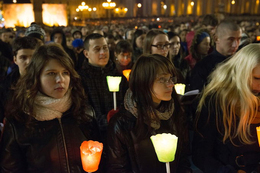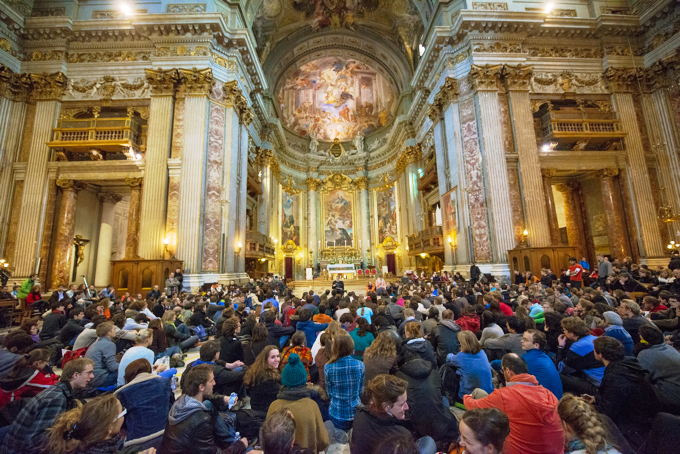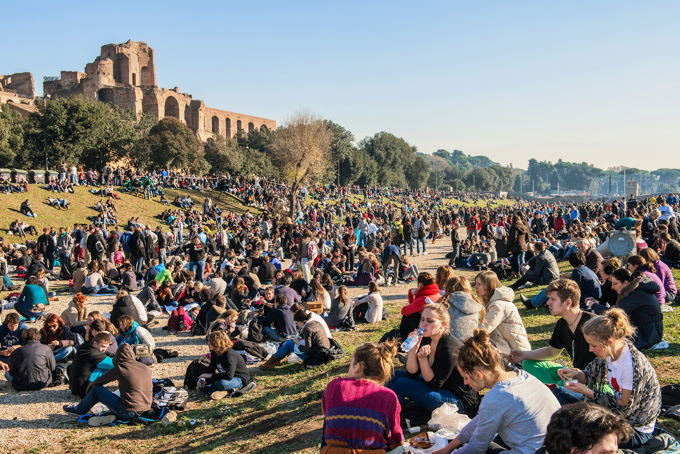Archbishop's message to the Taizé European Meeting
 Taizé 35th European Meeting in Rome. Photo: Taizé
Taizé 35th European Meeting in Rome. Photo: TaizéFriday 28th December 2012
Archbishop Rowan Williams has sent a message to the Taizé European Meeting in Rome. The meeting, from 28 December 2012 to 2 January 2013, will involve forty thousand young adults from across the European continent and beyond.They will gather for six days of prayer, reflection and life with parishes, families and religious communities in and around Rome.
This will be Taizé’s 35th European Meeting.

The Archbishop's message follows:
A Message from the Archbishop of Canterbury
to the Taizé European Meeting in Rome
28 December 2012 to 2 January 2013
Dear Friends in Christ
Last month, I spent a couple of days in the city of Christchurch in New Zealand, a city devastated by two major earthquakes in a very brief period. The centre of the city was still a grim sight – wrecked and disintegrating tower blocks, roads with great cracks in them, mountains of rubble and twisted metal. But some of the most effective clearing-up and emergency care had been done by a host of young people, the ‘Student Volunteer Army’, who had been assembled in a miraculously short time by tweets and text messages.
The whole process was the inspiration of one student, Sam Johnson, who had realised the power of electronic media in making things happen swiftly and effectively. We’re told that some of the big recent political upheavals in the Middle East were made possible by just this kind of contact. But here was a simple act of practical service brought into effect without fuss and with the minimum of institutional structure: a lesson in what we can achieve with our technological resources when our vision is clear.
Sam acted in trust. He believed that if a call went out, people would answer it, because he was convinced that when people are asked in the simplest terms whether they do or don’t want to make the world a more humane and compassionate place, most will say that they do. In the face of a terrible disaster, with nearly two hundred people dying and many made homeless, a whole city brought to a standstill, the question was a very straightforward one.
Faced with appalling natural disaster, many will ask if God can be trusted. There may be answers in theory; but the answer in practice is that God can be trusted if we respond with courage and generosity to God’s call to us through the needy. And we build up our own trust in God by thinking about those who respond in this way, those who show that effective, prompt and generous compassion is possible.
If we can strengthen our convictions by reflecting on lives and actions like this, we’re much more likely to feel we ourselves can take risks in inviting others to join us in service – to send out a word of invitation, perhaps, on the electronic waves to say, ‘Come and work alongside us – the world needs us to give a sign of hope.’
At the first Christmas, God sent out an invitation in the shape of a human life, Jesus of Nazareth. God trusted his creation to respond. And even when the reaction was fearful and hateful and drove Jesus to the Cross, God went on trusting that we were capable of answering the invitation of love and never stopped calling us and prompting us by his Spirit. Our own trustful action must reflect God’s trust in the world, and it will flow from the freedom, supported by God’s Spirit, to go on inviting our fellow men and women into love.
The story of Christchurch is a reminder that small acts of trustfulness can make a great difference. I hope that your meeting, your prayers and your meditations, will deepen your reliance on God’s trust in his creation, shown in the gift of Jesus’ life and death and resurrection, and will help you take the risks of trusting others to join with you in the work of God’s Kingdom.
With my love and blessings always,
+Rowan Cantuar:
From Lambeth Palace, London
Advent 2012
The Archbishop's message is also available at the Taizé website along with messages from other church leaders and further information about the Meeting.

